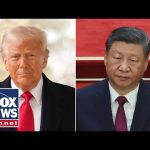China has fired another shot in the ongoing trade war by jacking up tariffs on American goods to a staggering 125%. This aggressive move comes as President Xi Jinping tries to rally European allies against what he calls U.S. “bullying.” The Chinese government claims America’s trade policies violate international rules and basic economic logic.
The tariff hike from 84% to 125% kicks in immediately. Chinese officials mocked U.S. trade tactics, calling them a “joke” that ignores how real markets work. They warned that if America keeps pushing, China will hit back even harder. These harsh words show Beijing’s refusal to back down in this high-stakes economic fight.
President Trump’s tough stance on China has already led to 145% tariffs on Chinese imports. The White House argues these measures protect American jobs and industries from unfair competition. Conservatives praise Trump for standing up to China’s long history of trade abuses and intellectual property theft.
China isn’t just talking tough—they’ve filed a formal complaint with the World Trade Organization. This legal move aims to paint America as the bad guy on the global stage. Meanwhile, Xi’s push for European support seems desperate, as allies grow wary of picking sides in this escalating conflict.
The trade battle is shaking up global markets. European stocks tanked after China’s announcement, with experts warning the risk of recession is rising fast. Everyday Americans could feel the pain through higher prices on goods, but conservatives argue short-term costs are worth defending against China’s economic aggression.
Some analysts say China’s tariff spike is mostly symbolic since U.S. exports to China have already plummeted. The real damage comes from supply chain disruptions and market uncertainty. Free trade advocates worry both nations are racing toward economic mutually assured destruction.
President Trump’s supporters see this as a necessary fight to reset trade relationships. They credit his policies with bringing manufacturing jobs back to America and reducing dependency on Chinese imports. The tariff strategy reflects a broader push to put America first in global dealings.
As the trade war heats up, conservatives emphasize that weakness only invites more bullying. They argue strong leadership and fair deals will ultimately protect U.S. interests against China’s expansionist ambitions. The path forward remains rocky, but staying firm could secure America’s economic future for generations.




